Testimony of the Day
“I just had a baby 8 weeks ago and followed Maria’s WOE the whole time. I occasionally went up to 60g carbs a day because I LOVE fruit and like to have it fresh and in season. I had the best, easiest pregnancy I ever had! I had very minimal morning sickness and less fatigue than with the others. I had no swelling and my blood pressure was perfect. I never experienced that extreme discomfort that so many women complain of. I 100% attribute a great pregnancy to Maria’s WOE. I gave birth naturally to a very healthy 7lb 5oz baby boy. I’m actually sad he’s the last one because my pregnancy was so wonderful.” -Sue
Click HERE to get started on your keto-adapted diet.
“Maria helped me lose 75 pounds in just over a year. The Maria’s way cleared up many health issues I had been struggling with, some my whole life. Losing the weight and getting into the best health of my life also helped me and my husband get pregnant after 7 years of trying and two miscarriages. We are due with our little girl in February. Thank you, Maria Emmerich, for changing my life.” Leah
KETO DURING PREGNANCY
I get a ton of emails a few months after these consults telling me that they are ecstatic and are now pregnant but are wondering about what to eat now. As if this diet of REAL food would be harmful to a fetus. There are many reasons why to not add in certain foods like gluten and dairy. Many times when cravings get the best of pregnant clients and they consume these foods, the auto-immune response results in a miscarriage. But even if the clients are committed to staying away from gluten and dairy, they often worry that too low of carbs is bad for the fetus. You will never find evidence of this, but you will read it all over the web. The information that clients read has a few flaws:
1. A huge mistake is when people and doctors compare benign dietary ketosis to diabetic ketoacidosis. You can produce ketones in a starvation state. So instead of using a well-formulated low carb diet, they starved pregnant rats to get them into ketosis. The flaw in that evidence should be obvious.
2. The last form of this “evidence” is when they sliced up the brains of rat fetuses and saturated them in ketones. What happened was that the brain cells lived but it stopped producing new brain cells. This is thought to be evidence that ketosis causes retardation.
Now let’s dive into the facts. The lean human body is 74% fat and 26% protein by calories. Fats are a structural part of every human cell and the preferred fuel source of the mitochondria, the energy-burning units of each cell. A fetus naturally uses ketones before and immediately after birth. Many studies done on pregnant pigs that are placed on ketogenic diets have fetuses with “increased fetal brain weight, cell size, and protein content. In the early stages of pregnancy, there is an upsurge in body fat accumulation, which is connected to hyperphagia and increased lipogenesis.
In the later stages of pregnancy there is an accelerated breakdown of fat depots, which plays an important role in fetal development. The fetus uses transported placental fatty acids as well as two other products: glycerol and ketone bodies. Even though glycerol crosses the placenta in slight proportions, it is a superior substrate for “maternal gluconeogenesis” (remember earlier, I discuss regular gluconeogenesis where we make glucose from protein when needed which is the preferred way of making glucose), and maternal glucose is the main substrate crossing the placenta. Heightened ketogenesis in fasting conditions or with the addition of MCT oils, creates an easy transference of ketones to the fetus which allows maternal ketone bodies to reach the fetus, where the ketones can be used as fuels for oxidative metabolism as well as lipogenic substrates.
During pregnancy, women become even more sensitive to carbohydrates due to an evolutionary adaption in which they become slightly insulin resistant to allow a positive flow of nutrients to the developing fetus through the placenta. If the mom was more insulin sensitive than the fetus we could end up in a nutrient shortage situation. Biology fixes this problem by making mom a little insulin resistant, effectively “pushing” nutrients to the fetus. This rationalizes just how important feeding you and your fetus a nutrient-dense ketogenic diet is.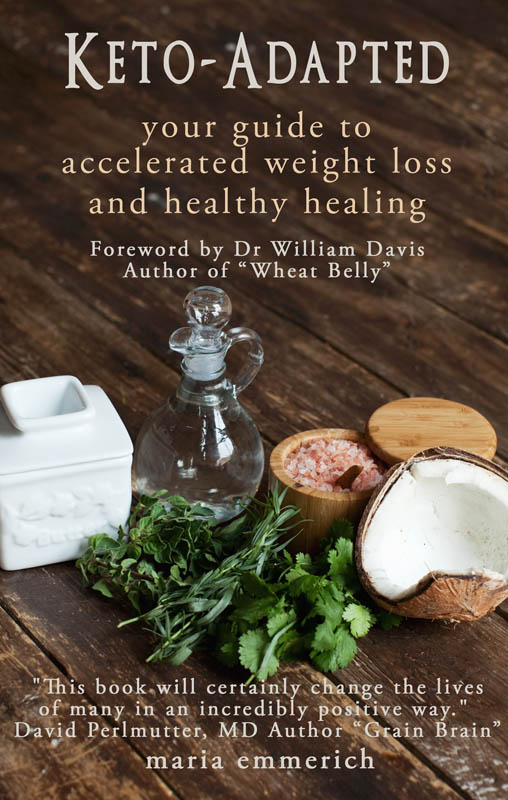
Breast-milk is naturally very high in fat as compared to a baby formula which is high in carbohydrates and sugar; causing babies to be addicted to sugar early in life. If a newborn is breastfed, it spends a lot of time in ketosis, and therefore keto-adapted. Keto-adapted babies can efficiently turn ketone bodies into acetyl-CoA and into myelin. Ketosis helps babies develop and build their brains. I love it when my clients continue to consume those “fat bombs” they ate to get pregnant because the coconut oil helps with the baby because coconut oil has anti-bacterial, anti-viral, and anti-fungal properties which keep the mother and baby healthy. The extra coconut oil also helps with lactation, but more importantly, the coconut oil increases lauric acid in breast milk. Lauric acid is a rare medium-chain fatty acid found in human breast milk that supports a healthy metabolism. Read more about this in my new book Keto-Adapted.
Click HERE to get a softcover.
Thank you all for your love and support!
3/4 cup miracle rice
2 cups unsweetened vanilla almond milk
A pinch of Celtic sea salt
Stevia glycerite (to taste)
1/2 tsp vanilla extract
1/2 tsp nutmeg (optional)
In a bowl, mix all the ingredients together. Let the pudding set up for a few minutes. Stir the pudding every five minutes. Makes 4 servings.
NUTRITIONAL COMPARISON (per serving)
Traditional Tapioca = 209 calories, 33 carbs, 0 fiber
“Healthified” Tapioca = 134 calories, 13 carbs, 10.5g fiber

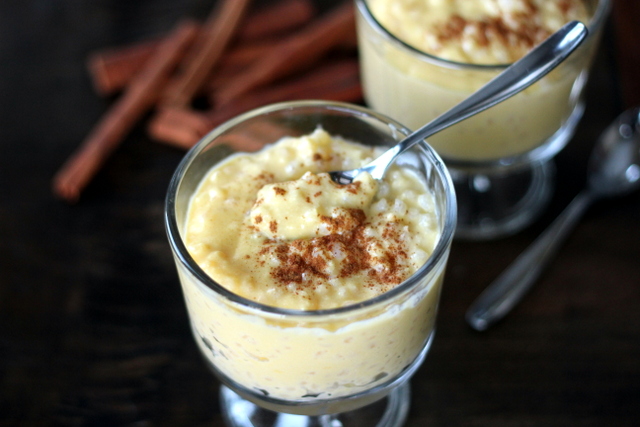



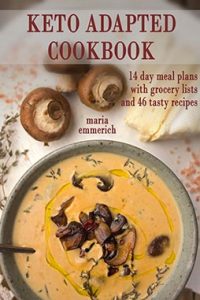




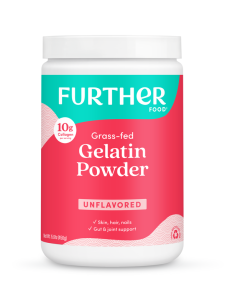



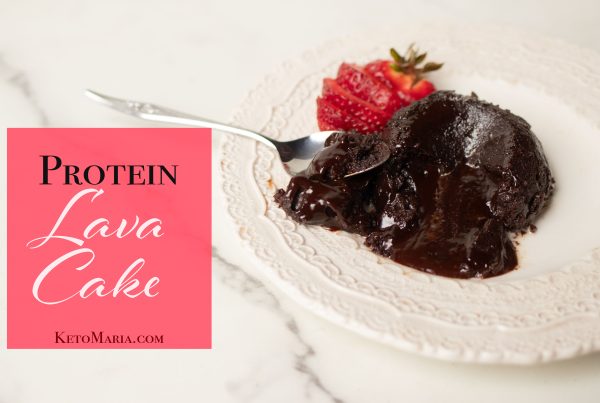
hi maria!
how many servings does this recipe make?
thanks, cant wait to try it!!
Opps, all fixed…4 servings:)
Hi Maria,
Would this also work as a breakfast pudding or is it only a dessert?
Hi Maria, I’ve been making this for awhile, since I got my first container of Chia seeds. For variations I’ve added cocoa & sugar free chocolate syrup. I also use SoDelicious Coconut milk (unsweetened) and DaVinci’s coconut syrup for a coconut cream pie pudding. And I’ve made a small batch as a hot breakfast cereal with sugar free maple syrup and zapped it in the microwave for a minute. I gets thick again after it cools a bit. Packed with nutrition and so yummy too.
ooh, thanks so much for posting this. I was going to ask if it could be made with coconut milk. I just l♥ve coconutty stuff! That would make me so happy in the morning… or in the afternoon.
Great idea!!! Yum!
I’ve heard such conflicting info on chia seeds and nuts in general with gut health, thoughts?
What info are you referring to?
that chia is harmful to the gut lining.
I haven’t seen any solid info linking that.
In general I recommend client keep chia intake low due to the amount of carbs that add up.
Thanks!
I just saw something similar sold here in Australia and they call them “Chia Pods”. Cute little containers that have coconut milk, chia seeds, vanilla, and cinnamon. I made it with a little stevia glycerite and it was divine! : )
I love this pudding. I only need 1/2 cup of chia seeds for this recipe. It’s a great dessert for me.
Thanks!
Hi Maria
Do you use the white chia seeds for this recipe or the plain dark ones? Thank you
Kind regards
If you click on the ingredient you can see the ones I use. They are the dark ones. This photo is an alternate option make with miracle rice. 🙂
I’m confused. What is the difference between stevia and stevia glycerite? I only have the clear stevia.
Glycerite is less bitter. 🙂
Hi Maria, I am a long time follower, have fallen off the wagon a few times, but always come back to this WOE as I feel great on this.(I know, why would I keep hurting myself right?) anyways, I just read on another site that Chia is not recommended due to it preventing absorbtion of nutrients… how often should one use chia in their diets?
I no longer recommend chia at all. It is estrogenic.